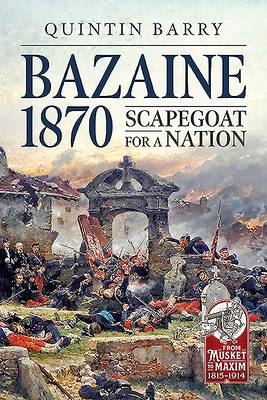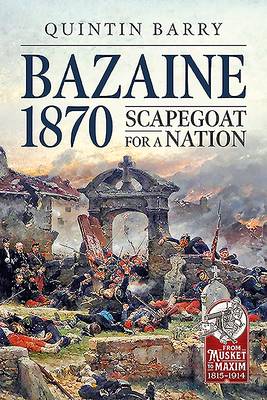
- Afhalen na 1 uur in een winkel met voorraad
- Gratis thuislevering in België vanaf € 30
- Ruim aanbod met 7 miljoen producten
- Afhalen na 1 uur in een winkel met voorraad
- Gratis thuislevering in België vanaf € 30
- Ruim aanbod met 7 miljoen producten
Zoeken
Omschrijving
Defeated commanders are frequently blamed for the decisions which they made, sometimes with serious or even fatal consequences. The case of the unfortunate Admiral Byng is an example from British naval history. In France in 1870, Marshal Francois-Achille Bazaine, the commander of the French army that surrendered at Metz during the Franco-Prussian war, was held responsible not only for what was alleged to be a breach of military discipline, but also, by many in France, was believed to have been guilty of treason. When the war ended with France's crushing defeat, national pride demanded a scapegoat, and it was Bazaine who was blamed for just about everything that had gone so very wrong.
He was the victim not only of a wholly unjustified accusation of treason by the Government of National Defence, which had seized power with the fall of the Second Empire, but of a number of books written to attack him for his military decisions and his motives in surrendering his army and the fortress of Metz after an extended siege. Chief among his persecutors was Colonel Gaston d'Andlau, who nourished a bitter personal grievance against the Marshal, who had refused to find a place for him on his personal staff on the grounds of his unreliability. Popular resentment against Bazaine was fanned by the French Press, which gleefully reported many of the most ludicrous allegations which were being made against him.
Ultimately, after a lengthy public enquiry which did not exonerate him, he demanded a court martial, and he was put on trial under the French military code, facing charges which arose from a decree of the first Napoleon; he was not charged with treason, though allegations of this hung over the proceedings even though demonstrated to be wholly false.
The trial lasted more than two months; when it concluded, the court found Bazaine guilty on each of the charges which he faced, and sentenced him to death. At the same time, having regard to his distinguished former service, the court sent a letter to President MacMahon asking that the sentence be commuted to be one of imprisonment. MacMahon did so, and Bazaine was imprisoned for a term of twenty years, and sent to the Château d'If on the Ile Ste Marguerite, the prison which had housed the 'Man in the Iron Mask.' From here, after some eight months, he escaped with the help of his young Mexican wife Pepita, and ultimately settled in exile in Madrid.
Although a number of historians to their credit defended Bazaine, pointing out the gross injustice of the charges, the legend of his culpability was maintained by others who continued to assert his guilt. This book, which is the first book in the English language devoted to the story of Bazaine to be published for three quarters of a century, describes his lengthy and illustrious career before the start of the Franco-Prussian war, and the circumstances in which he came to take command of the Army of the Rhine. It assesses his conduct of the series of pitched battles which he fought around Metz, before he withdrew with his army under the protection of the fortress. The book goes on to describe the subsequent fate of the army, and the negotiations by which Bazaine endeavored to extricate it, as well as his subsequent trial; and concludes that, beyond doubt, he was unjustly accused and wrongly convicted.
He was the victim not only of a wholly unjustified accusation of treason by the Government of National Defence, which had seized power with the fall of the Second Empire, but of a number of books written to attack him for his military decisions and his motives in surrendering his army and the fortress of Metz after an extended siege. Chief among his persecutors was Colonel Gaston d'Andlau, who nourished a bitter personal grievance against the Marshal, who had refused to find a place for him on his personal staff on the grounds of his unreliability. Popular resentment against Bazaine was fanned by the French Press, which gleefully reported many of the most ludicrous allegations which were being made against him.
Ultimately, after a lengthy public enquiry which did not exonerate him, he demanded a court martial, and he was put on trial under the French military code, facing charges which arose from a decree of the first Napoleon; he was not charged with treason, though allegations of this hung over the proceedings even though demonstrated to be wholly false.
The trial lasted more than two months; when it concluded, the court found Bazaine guilty on each of the charges which he faced, and sentenced him to death. At the same time, having regard to his distinguished former service, the court sent a letter to President MacMahon asking that the sentence be commuted to be one of imprisonment. MacMahon did so, and Bazaine was imprisoned for a term of twenty years, and sent to the Château d'If on the Ile Ste Marguerite, the prison which had housed the 'Man in the Iron Mask.' From here, after some eight months, he escaped with the help of his young Mexican wife Pepita, and ultimately settled in exile in Madrid.
Although a number of historians to their credit defended Bazaine, pointing out the gross injustice of the charges, the legend of his culpability was maintained by others who continued to assert his guilt. This book, which is the first book in the English language devoted to the story of Bazaine to be published for three quarters of a century, describes his lengthy and illustrious career before the start of the Franco-Prussian war, and the circumstances in which he came to take command of the Army of the Rhine. It assesses his conduct of the series of pitched battles which he fought around Metz, before he withdrew with his army under the protection of the fortress. The book goes on to describe the subsequent fate of the army, and the negotiations by which Bazaine endeavored to extricate it, as well as his subsequent trial; and concludes that, beyond doubt, he was unjustly accused and wrongly convicted.
Specificaties
Betrokkenen
- Auteur(s):
- Uitgeverij:
Inhoud
- Aantal bladzijden:
- 320
- Taal:
- Engels
- Reeks:
Eigenschappen
- Productcode (EAN):
- 9781913336080
- Verschijningsdatum:
- 23/11/2020
- Uitvoering:
- Hardcover
- Formaat:
- Genaaid
- Afmetingen:
- 157 mm x 236 mm
- Gewicht:
- 861 g

Alleen bij Standaard Boekhandel
+ 97 punten op je klantenkaart van Standaard Boekhandel
Beoordelingen
We publiceren alleen reviews die voldoen aan de voorwaarden voor reviews. Bekijk onze voorwaarden voor reviews.











